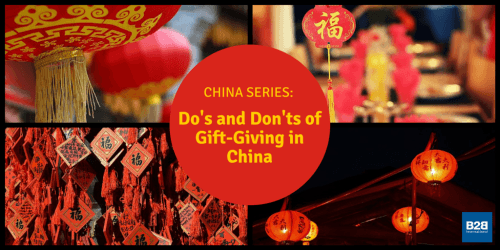Chinese New Year is right around the corner and to celebrate we thought we’d create a series of blog posts all about China. Today, in the third part of the series, we take a look at some crucial do’s and don’ts when it comes to gift-giving in China. Enjoy!

In our previous article we discussed the difficulties of navigating cultural obstacles in China and stressed the importance of getting it right. In this post we turn our attention to the specific etiquette of gift-giving. More so than in the West, the giving of gifts is an important tool for building strong business relationships in China. The whole process of trading gifts, whether in a private or business context, is guided by strict rules.
For example, the value of the gift presented depends on the rank of the person who receives it. Furthermore, in contrast to Western tradition, the receiver of a gift in China will often decline to open it in view of the giver, as this would be in bad taste. Amidst the current political crackdown on high-level corruption, you need not be surprised if your gift is politely refused at the outset. But most small gifts are perceived as an offering of respect and need not be associated with bribery.
The impact of a well-researched and correctly presented gift cannot be underestimated. Below we present some handy tips on what gifts you should (and shouldn’t!) bring to your next business meeting in China.
What To Avoid…
Clocks
A timepiece of any description (wrist-watch, clock etc.) symbolises the passing (and running out) of time and thus is strongly associated with death. Furthermore, in our previous article we explained that the characters送鐘 (sòng zhōng: to give a clock) sound like 送終 ( sòng zhōng: to pay ones last respects).
White, Black or Yellow
White and black are associated with death as they are used in funeral ceremonies. White or yellow flowers are also given at funerals and should be avoided. It is best to use wrapping paper or envelopes in red or gold, as these colours herald wealth and good fortune.
The Number 4
The character for the number four (四 sì) sounds like the character meaning ‘death’ (死sǐ). Therefore anything in a set of four is considered taboo. During Chinese New Year, remember to avoid filling ‘red envelopes’ with money of a value containing the number four.
…And What To Hand Over With Pride
Whisky
With the growing middle class in China, comes a growing love of whisky. The caramel coloured liquor is becoming a mark of status and success. If you have ever visited China, it is hard not to notice the bottles littering the table-tops of dancefloor night clubs and KTV suites. This growing market is one that companies like Diageo are cashing in on, with sales of its Johnnie Walker brand increasing 64% year-on-year since 2011 (according to The Telegraph). In China, gifting a bottle of the so-called ‘water of life’ has both Western appeal as well as an allure of high class luxury.
Cigarettes
China is the world’s largest consumer of tobacco and smoking is considered socially acceptable. The Western taboo surrounding passive smoking has failed to reach China: although legislation does exist, the ban on public smoking is rarely, if ever, implemented in practice. On a recent trip to China we were dismayed to find ourselves trapped in a lift next to a man who was smoking. With complete disregard for our ability to breathe, we travelled slowly to the 10th floor. Do not hesitate, therefore, to bring cigarettes on your next business trip – it will no doubt be greatly appreciated.
Something From Home
The value of objects from your home country or area should not be discredited. Think local delicacies or tourist trinkets that you may initially dismiss as tacky. An article by Deb Weidenhamer in the New York Times describes how she relies on 3 stock items when visiting Chinese clients: a coffee table book of photos from her hometown, a snow globe and a sweet made from cactus. In this case it’s the thought that counts, not the value. The more stories you can tell about the object, and the more personal, the better.
To read more about China, please refer to the white papers below:
Entering Chinese Business to Business Markets: The Challenges & Opportunities Marketing and Selling to Chinese Businesses Business-to-Business Market Research in China


